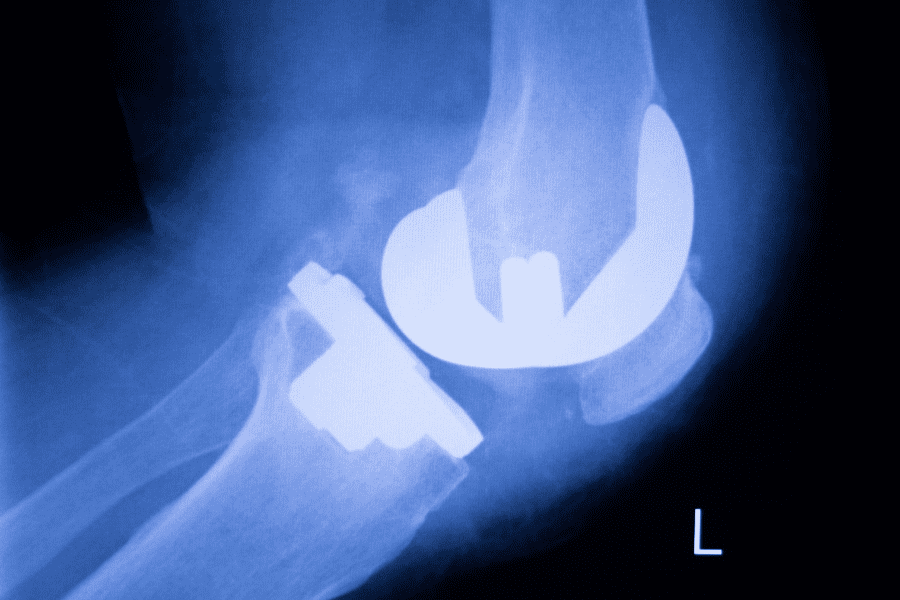 What is knee replacement surgery?
What is knee replacement surgery?- Are there different types of knee replacement surgery?
- What are the signs that I need a knee replacement?
- What is the average age for knee replacement surgery?
Chronic knee pain can be debilitating. As mobility in the knee decreases, many people find it increasingly challenging to keep up with their responsibilities, oftentimes forced to miss activities they normally enjoy.
Knee replacement surgery, also known as total knee arthroplasty, is a procedure that repairs damage to the knee, restoring mobility and relieving discomfort in patients who struggle with debilitating knee pain.
Thanks to advances in surgical technology, knee replacement is now a routine procedure in most hospitals, offering patients a safe and effective solution for knee pain. In fact, each year, more than 600,000 of these procedures are performed successfully in the United States, with 90% of patients experiencing a reduction in pain after their procedure.
If you’re experiencing chronic knee pain, knee replacement may be the right procedure for you and could eliminate your stiffness and discomfort. However, surgery can be daunting, and there are several factors you should consider before undergoing the procedure.
Like many patients, you may be wondering if you are too young or too old for a knee replacement. Is there an appropriate age to have the surgery?
What Is Knee Replacement Surgery?
 To explain the procedure, let’s take a look at the knee itself. The knee joint is a complex weight-supporting structure that joins the upper leg bone (femur) and the lower part of the leg (tibia). During total knee replacement surgery, your doctor removes the bone and cartilage of the knee joint and replaces them with an artificial, human-made ceramic, plastic, or metal structure.
To explain the procedure, let’s take a look at the knee itself. The knee joint is a complex weight-supporting structure that joins the upper leg bone (femur) and the lower part of the leg (tibia). During total knee replacement surgery, your doctor removes the bone and cartilage of the knee joint and replaces them with an artificial, human-made ceramic, plastic, or metal structure.
Six steps are involved during total knee replacement surgery:
- Anesthesia
- A small cut is made around the knee to access the joint
- Removal of damaged bone and cartilage
- Implantation of the prosthesis along the femur and tibia
- Prosthesis mobility check and adjustment
- Closing of the incision, followed by a recovery period
Technology has advanced to the point where many patients can return home the same day as their outpatient procedure, offering a quick turnaround and return to normal life.
Are There Different Types of Knee Replacement?
There are two primary types of knee replacement surgery. These include:
- Total Knee Replacement (the entire joint is removed and replaced)
- Partial Knee Replacement (only the damaged area of the joint is replaced)
The knee has four compartments. Each can develop arthritis, causing stiffness and pain. In some patients, a partial knee replacement can take care of the issue by just replacing one knee compartment. Doctors can even perform multiple unicompartmental knee replacements, where more than one compartment is selectively replaced with a prosthesis in several areas. In contrast, total knee replacement removes and replaces the entire joint.
The type of surgery that is best for you will depend on what your doctor believes will offer the most relief by eliminating the pain and stiffness of your worn-out knee.
In each case, your doctor will select the right prosthetic to match your body type, using replacement parts composed of either metal alloys or ceramic. To facilitate mobility, your doctor may insert plastic spacers to reduce friction.
What are the Signs That I Need a Knee Replacement?
 There are several signs you may need a knee replacement, including:
There are several signs you may need a knee replacement, including:
- Chronic Knee Pain (fails to resolve with conservative [non-surgical] treatments)
- Limited Mobility
- Bone Deformities (valgus/knock-knee)
- Loss of Knee Function
When the joint cartilage in the knee joint wears away, the bones rub together painfully, causing severe discomfort and stiffness. Osteoarthritis can set in, further degrading the joint, which will make walking and other movements increasingly difficult. The prosthetics used in knee replacement surgery are smooth, just like the surfaces of a new knee, eliminating the friction between surfaces that causes discomfort.
It’s essential to consult with an orthopedic surgeon to determine if knee replacement surgery is right for you.
Your doctor will perform a thorough physical examination, review your medical history and imaging tests, and possibly recommend additional testing before considering surgery. The decision to undergo surgery depends on the condition of the joint, your age, and your activity level. Is there an optimum age for knee replacement?
What Is the Average Age of Knee Replacement Patients?
 Most total knee replacements are performed on patients who are between the age of 60 and 80. However, the decision to have a knee replacement is based on individual factors such as the severity of knee pain and disability. Increasingly, younger people with severe knee arthritis, trauma, or genetic conditions may also be candidates for the surgery.
Most total knee replacements are performed on patients who are between the age of 60 and 80. However, the decision to have a knee replacement is based on individual factors such as the severity of knee pain and disability. Increasingly, younger people with severe knee arthritis, trauma, or genetic conditions may also be candidates for the surgery.
So, how young is too young for total knee replacement? When considering surgery, doctors look at several factors, including:
- Will knee replacement improve your quality of life?
- Could the knee replacement alleviate pain and restore function?
- Would a total knee replacement help you maintain or improve fitness and health?
Aside from the normal risks of surgery, the most significant risk for younger patients in their 40s and 50s is that the artificial prosthetic could wear out prematurely and need replacement. Many doctors use this criterion to determine when you may need a knee replacement. Generally, knee replacement implants function well for up to 20 years in 90% of patients.
However, highly active patients may put more wear and tear on the joint, which could cause the prosthesis to decline prematurely.
To get the most out of your new joint, many doctors recommend low-impact activities such as:
- Cycling
- Golf
- Hiking and walking
- Low-impact aerobics
- Low-resistance weightlifting
- Swimming
- Yoga
No matter your age, if you undergo total knee replacement, you should avoid high-impact activities such as:
- Basketball
- Gymnastics
- Football
- Hockey
- Jogging
- Rock climbing
- Soccer
- Tennis
- Volleyball
In general, age is not the primary determining factor of whether or not someone can receive knee replacement surgery. For most patients, eligibility is determined by current health, the potential benefits of surgery, and the lifespan of the prosthesis.
Studies show that the under-55 age group will continue to be the fastest-growing population seeking total knee replacement by 2030. These studies also show that knee replacement surgeries offer consistently promising results. More than 85% of patients under age 50 who have total knee replacement say they are pleased with the outcome. For 98% of these patients, their replacement knees continued to function well a decade after the procedure.
No matter your age, you have options.



